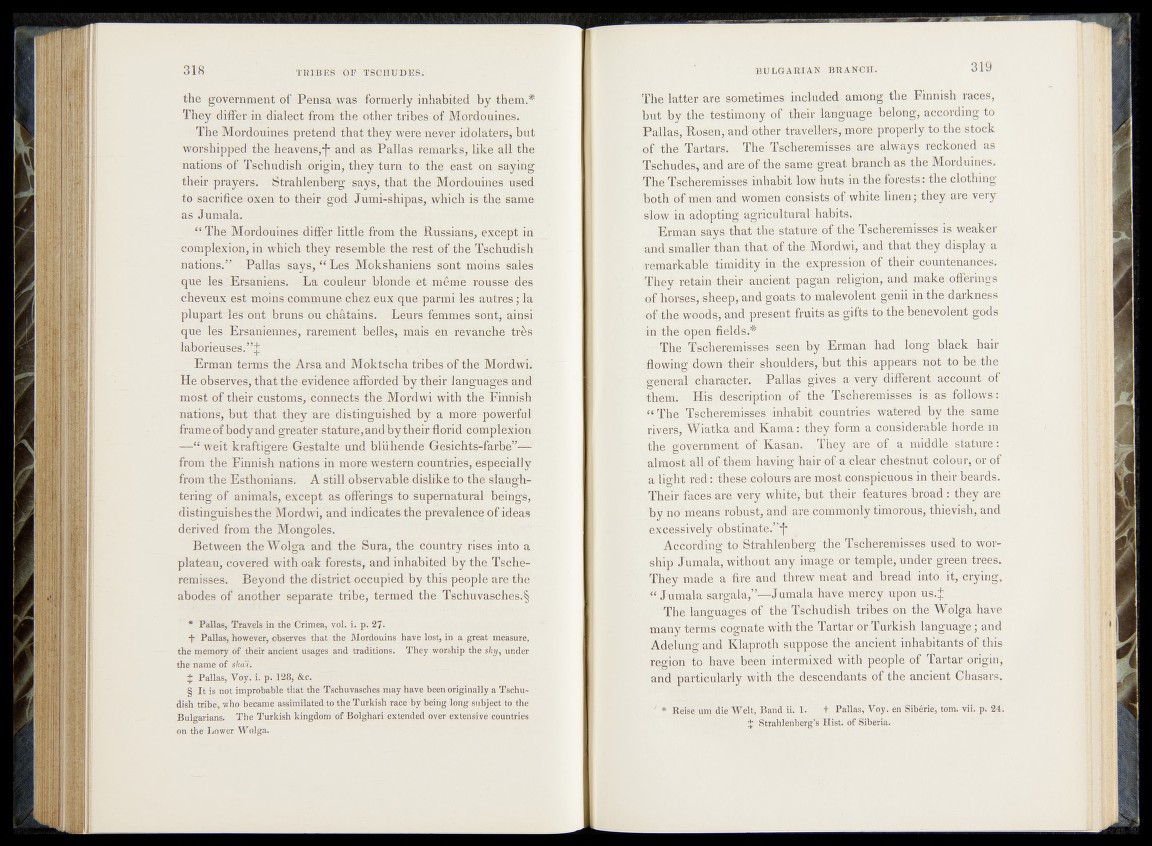
the government of Pensa was formerly inhabited by them.*
They differ in dialect front the other tribes"of Mordonines.
The Mordouines pretend that they were never idolaters, but
worshipped the h e a v e n s,a n d as Pallas remarks, like all the
nations of Tschudish origin, they turn to- the east on saying
their prayersi Strahlenberg says, that the Mordouines used
to sacrifice oxen to their 'god Jumi-shipas, which is -the same-
as J u ni ala .
“ The Mordouines differ little from the Russians, except in
complexion, in which they resemble the rest of the Tschudish
nations.” Pallas says, “ Les Mokshaniens sont moins sales
que les : Ersaniens. La couleur blonde et même rousse des
cheveux est moins commune chez eux que parmi les autres ; la
plupart le§ ont bruns ou châtains. Leurs femmes sont, ainsi
que les Ersaniehnesj rarement belled, mais en revanche très
laborieuses.”^
Erman terms the Arsa and Moktscha tribes of the Mordwi.
He observes, that the evidence affordêcTBy their language® and
most of their customs, connects the Mordwi with the Finnish
nations, but that they are distinguished by a mOre- powerful
frame of body and greater stature, and by their florid complexion'
—“ weit kraftigere-Gestalte und bluffende GesicMff-farbe”—^
from the Finnish nations in more western countries, especially
from the Esthonians. A still observable dislike to th e slaughtering
of animals, except as offerings to . supernatural beiiigüy
distinguishes the Mordwi, and indicates the prevalence of ideas
derived from the Mongoles.
Between the Wolga and the Sura, the Country rises into a
plateau, covered with oak forests, and inhabited by the.Tscffe-
remisses. Beyond the district occupied by this people are the
abodes of another separate tribe, termed the Tschuvasches.§ *§
* Pallas, Travels in the Crimea, vol. i. p. 27-
•f- Pallas, however, observes that the Mordouins have lost, in a great measure,
the memory of their ancient usages and traditions. They worship the -sky, under
the name of s k a i: ■
J Pallas, Voy. i. pi 128, &c.
§ I t is not improbable that the Tschuvasches may have been originally a Tschudish
tribe, who became assimilated to the Turkish race by being long subjèct to the
Bulgarians. The Turkish kingdom of Bolghari extended over extensive countries
on the Lower Wolga.
The latter hre sometimes? included among the Finnish races,
b u t by.the--testimony of their language belong, according to
Pallas, Rosen, and other traveller's? more properly to the stock
of the Tartars. The Tscheremisses are always reckoned as
Tschudesy and are:of the same great branch as the Morduines,
The TSeheremisses inhabit low huts in the forests: the clothing
both ~$|men and women consists>o^white linen; they, are very
.slow in adopting'.agricplfnaral1 habits.
Erman says.that the stature jtaf SheTscherem'isses is weaker
and smaller than tffaffof the Mordwi, arid that,they-display a
Tepjarkable timidity in; the e x p re s s ^ ^ ;f tff eircounteüances.
They'retain their ^ancient .pagan ,-religion, and make offerings
of horses),/sheep,, and goats, to malevolent p u f f in the darkness
■of thé. woodland present fruits.as gifts.to the benevolent gods
ffetheopen fields.*
—The TscherejrriisseSi seen by Erman had -.long black hair
'flowing11 dowm thedr:-shoulders^ but this appears npt to, be tffp
jgeraeiril^ebaracter. Pallas^gives. R veïy differentrupeount of
therri; ■ HieiSbsetiptinjft^f Uff e , Ts<|hëiemisses is) as-“follows:
‘‘ The Tscheremisses inhabit ^luntciësélwatexed by^ffie-same
risers, Wiatka and Kama: they form R^risiéerablè' horde in
the gox&rrimept of Kasan. /They-' afffjpf, a middle stature:'
almost rail of-themhaving hair-óf-a blear e fff^u t'co lo u r, ©r of
a,-ligB'f red : these .coloursare most conspicuous inf|ffei®beards.
Their faces .are very white, but tfe.qar featured broad^they are
by noffneansróffrist, .arid are chjKmonly timofbffsy thievish, and
excessively obstinate'.',if*
Accordin^tb StrahlebbéïÉ 'the Tscheremistfeïl Used to wor-
ship Jumala, without any image temple, u n d e rjg ^ lrtr’eesl
They triffde a fire and l^ e y f rriérit and bread into ft, crying^
“ Jumala sargala,”—Jumala 'fik^èTnërc^.u^on u s£ jr'
The lariguages of the Tschudish tribës^dpthfe Wolga have
many terms' cognate with the’ Tartar Or Turkish' languÉ^è; and
Adelung and Klaproth suppoSelidie ahefent inhabitants of this
region to have been intermixed with pêoprffof Tartar origin,
and'p|É!|cularly with the descendants of the ancient Chasars.
•" * Reise um die Welt, BanclWl. ' +] Pallas, tioyvin ‘Sibéne, törü. Vil. p. M .
$ Stiahlenherg’s Hist. ri' Siheria.